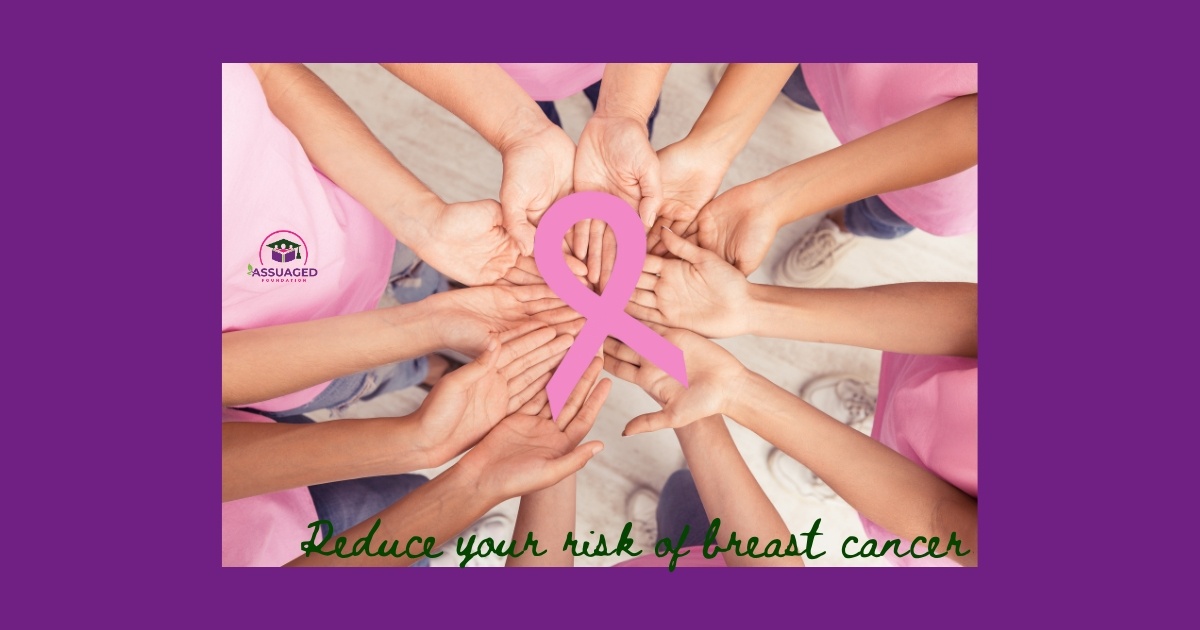How Diet and Exercise Can Help Reduce the Risk of Breast Cancer
Breast Cancer is one of the most common cancers affecting women 50 and older, but it can affect younger women. 80 % of cancers are invasive and can spread to other parts of the body. In the United States, 1 in 8 women will learn they have breast cancer.
Many lifestyle factors can reduce the risk of breast cancer. Maintaining a healthy diet and including healthy foods such as vegetables, fruit, calcium-rich dairy foods, lean protein, and avoiding red meat and processed foods can reduce the risk. Avoiding alcohol or limiting to one drink a day is recommended.
The American Cancer Society recommends that adults get 150 to 300 minutes of moderate-intensity or 75 to 150 minutes of vigorous-intensity activity each week (or a combination) due to its effects on body weight, inflammation, and hormone levels.
Research shows that up to 30% of breast cancer cases could be prevented through lifestyle changes, including diet and exercise. Women who exercise regularly and maintain a healthy diet can reduce their breast cancer risk by up to 20%. The connection between what we eat, how active we are, and cancer prevention is stronger than ever.
Understanding Breast Cancer and Risk Factors
Breast cancer is cancer that forms in the tissues of the breasts. Cells mutate and become cancerous, which multiply to form tumors.
Ductal carcinoma is the most common type of cancer, which begins in the lining of milk ducts. Lobular carcinoma starts in the milk glands of the breast. Another type, Ductal carcinoma in situ, begins in milk ducts but does not spread from there. Less common types include Triple Negative, Inflammatory, and Paget’s disease of the breast. 80 % are invasive and spread to other parts of your body.
Breast cancer is very complex, and environmental and genetic factors play a significant role in its development. Having a sister, mother, or daughter with breast cancer doubles a woman's chance of developing the disease [2]. Genetics are not alone, though. Dietary patterns, physical activity levels, and exposure to carcinogens in the household can all play a role and may confound the link between family history and cancer risk.
Bilateral breast cancer accounts for between 2% and 11% of all breast cancers. The risk of bilateral breast cancer is associated with early age of onset of the first breast cancer. Family history has been consistently associated with the risk of bilateral cancer [1].
Recognizing the role of family history in predicting breast cancer can help individuals and healthcare professionals tailor screening and prevention programs to manage risk effectively.
There are many risk factors for breast cancer, with them being either modifiable or non-modifiable. Parity, Body Mass Index, and oral contraceptives are known modifiable risk factors. Family history, age, and menopausal status are the top non-modifiable risk factors [3].
Lifestyle modifications can be a good form of prevention. Maintaining a healthy weight, engaging in regular physical activity, limiting alcohol consumption, and considering the timing of hormone therapy post-menopause are all areas to discuss with healthcare providers.

The Role of Diet in Breast Cancer Prevention
Breast cancer is a hormone-related malignancy, and diet may influence the risk of cancer because of its effects on hormone levels and growth factors. A high intake of vegetables is associated with a decreased risk of breast cancer by 20-25 %[4].
Dairy foods, especially milk, are linked with higher risks of breast cancer. Considering soy to replace dairy would be beneficial, as a lower incidence is seen in the absence of dairy. About 75 % of dairy cows that provide milk are pregnant and lactating. Due to this, there are high levels of estrogen and progesterone, which both influence breast development [5]. Processed foods, including meat, are associated with a higher risk of breast cancer [6]. Studies show that this could be a modifiable lifestyle factor in reducing not only breast cancer but many other types as well.
Mediterranean diets can be beneficial in reducing the risk of breast cancer. This diet involves olive oil, a high consumption of plant-based foods such as nuts, fruits, legumes and vegetables, fish, and whole grains, and limited consumption of red meat, sugar, milk, butter, and whole-fat dairy products. The diet is meant to lower lipids, protect against oxidative stress, inflammation, and platelet aggregation, and modify the hormones and growth factors involved in breast cancer. Generally, this diet is beneficial as it encourages healthy behaviors that lower the risks of breast cancer or any cancer [7].
Plant-based diets contain minimally processed fruits, vegetables, whole grains, legumes, nuts and seeds, herbs, and spices. Like the Mediterranean diet, they aim to maintain a healthy weight and limit the risk factors contributing to cancer.

Exercise and Its Role in Breast Cancer
Physical activity such as aerobic exercises, strength training, and flexibility exercises each provide unique health benefits that can help reduce the risk of breast cancer. Engaging in a combination of these exercises has been linked to improved overall health and a lower risk of developing cancer due to their effects on body weight, hormonal balance, immune function, and inflammation control [8].
Aerobic exercises such as running, walking, cycling, and swimming maintain a healthy weight. This type of regular activity reduces estrogen levels, a hormone linked to breast cancer. It also helps improve insulin sensitivity.
Strength training includes weightlifting and resistance exercises. This exercise helps build lean muscle mass, regulate hormone levels, and boost metabolism. It can also enhance bone density and reduce body fat, two contributing factors to breast cancer [9].
Flexibility can also reduce the risk of breast cancer. Yoga and stretching are two examples that help improve joint mobility, relieve tension, and lower stress levels. This stress reduction can positively affect an individual's immune system and hormonal balance. Circulation improvements are seen, which can help the recovery process after treatments and also encourage overall health by improving posture and muscle balance [10].
Lifestyle Changes for Breast Cancer Prevention
Limiting alcohol consumption, quitting smoking, and managing stress and mental health are also significant changes to consider in prevention.
Adopting a healthy lifestyle that incorporates balanced nutrition and regular exercise can significantly reduce the risk of breast cancer. A nutrient-rich diet, filled with fruits, vegetables, lean proteins, and whole grains, helps regulate body weight, support immune function, and maintain hormonal balance—key factors in preventing cancer.
Meanwhile, consistent physical activity, including aerobic exercises, strength training, and flexibility work, boosts metabolism, reduces body fat, and lowers stress levels, all of which contribute to lowering breast cancer risk. While no single factor can guarantee prevention, making these lifestyle changes fosters overall health and plays a vital role in reducing the likelihood of breast cancer. Empowering yourself with these habits is a proactive step toward a healthier future.
Choosing a healthy plant-based and vegan diet is most beneficial when it comes to:
-
Higher levels of energy;
-
Improved sleep;
-
 Aids in energy and overall happiness;
Aids in energy and overall happiness; -
Provides a sense of comfort and relief;
-
Could prevent major diseases such as obesity and diabetes;
-
Accomplish weight-loss and management; and
-
Improves mental and cognitive functioning.
There are really no excuses not to try healthier habits in your everyday life. If you are a man or woman looking for specific benefits of adopting healthier habits or just want to know about the general healing properties of herbs. Please remember to comment or post any health questions, or contact us directly!
















